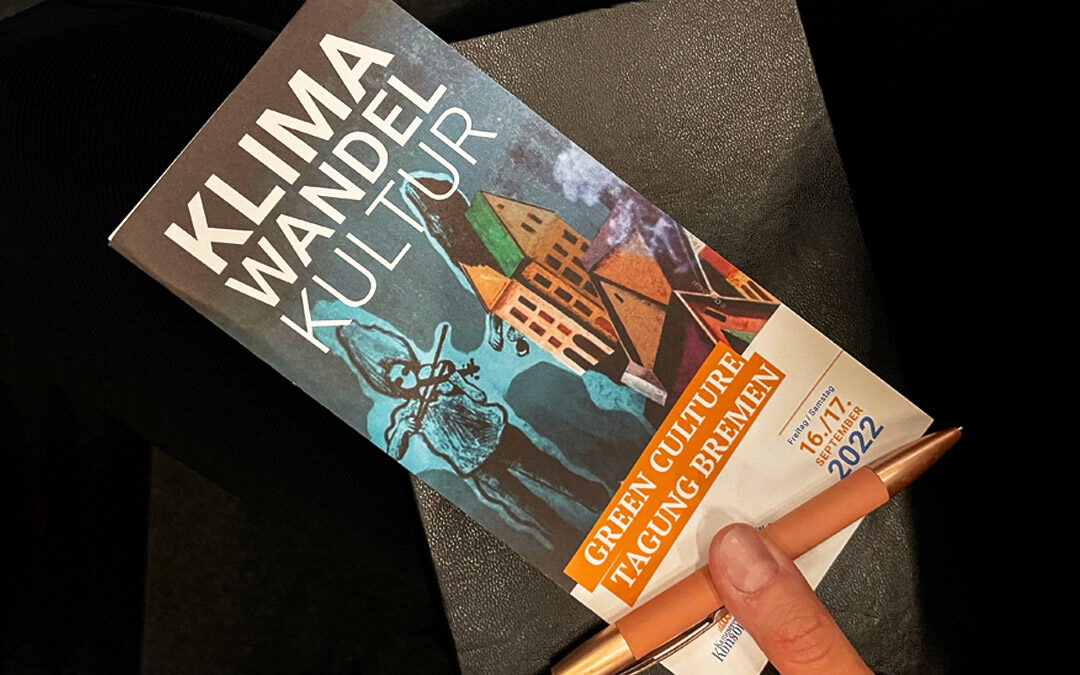On September 16 and 17, 2022, the Green Culture Conference took place at the Theater am Leibnizplatz in Bremen. Under the motto “Climate – Change – Culture”, stakeholders from politics, administration, science and culture spent two days discussing sustainable action in the field of art and culture. Climate and environmental protection has long since arrived in the cultural sector: whether in drama and dance, film, music, literature or the visual arts – artists from various disciplines are involving their audiences in reflecting on climate change and environmental pollution and actively working towards a healthier planet. In science communication, too, many renowned scientists and research centers are now using artistic aesthetic methods to communicate climate and environmental protection issues in a multisensory, innovative way.
At the Green Culture Conference in Bremen, the panel included (from left to right) Nicola Bramkamp (Save the world), Daniela Koß (Lower Saxony Foundation), Sylvia Amann (inforelais, Linz), Dr. Ralf Weiß (moderator / Culture4Climate), Dr. Sebastian Brünger (German Federal Cultural Foundation), Heidi Pesch (Climate Protection Management at the Senator for Climate Protection, Environment, Mobility, Urban Development and Housing, Bremen) and Christian Kindscher (Senator for Culture, Bremen).
The speakers at the event were high-calibre: the conference was opened with a video message from the Minister of State for Culture and Media, Claudia Roth, and Bremen’s Senator for Climate Protection, Mobility, Urban Development and Housing, Dr. Maike Schäfer. Prof. Dr. Antje Boetius, Director of the Alfred Wegener Institute in Bremerhaven, also gave an inspiring keynote speech.
In addition to concrete examples and practical reports from various cultural institutions in Bremen and the Berlin University of the Arts, there was an exciting panel discussion on the topic of “Art – Climate – Coal: funding programs and supporting municipal structures”. There was a lively discussion about whether sustainability should be more firmly anchored as a decision-making criterion in cultural funding and how this should ideally be implemented. For example, do appeals and incentives in the funding principles stimulate enough or must there be concrete guidelines and conditions, especially with regard to institutional funding, in order to implement climate-friendly behavior more strongly in the funded art and cultural landscape?
The “Neustart Kultur” funding program has made it clear that it is important to create offers rather than requirements in the funding landscape. The funding of processes instead of projects was discussed, as it reduces the production pressure in the funded institutions and leads to better productions instead of the implementation of as many productions as possible.
Political commitment is required when it comes to determining the budgets for the various directions of public funding programs: it is not enough to focus solely on the energy-efficient renovation of venues and museums, but rather laboratory spaces for art and culture are needed if the change towards climate-neutral production methods is to succeed in this area. Climate protection is a cross-cutting issue that must be reflected in all decisions and grants. It was also pointed out that it must be kept in mind that projects with too little culture on the one hand or too little climate protection on the other must continue to receive funding.
Overall, the question remains as to whether sustainability as a criterion should be given greater importance alongside the ubiquitous criteria of economic efficiency and economy in the funding context. There was unanimity in the view that the climate transition is a cross-sectional task that can only be accomplished through cooperative work. Here, too, the need for experimental spaces was clearly emphasized once again and, on the other hand, it was pointed out that the critical infrastructure in the cultural sector should also be given absolute priority, as resources will continue to remain at an unprecedentedly high price level.
By attending the conference, aconium GmbH was able to take away interesting approaches and participate in a direct exchange with local stakeholders.
To get a quick and easy overview of funding opportunities, current calls and other interesting events and information on the subject of funding, please refer to the aconium funding app, which can be downloaded free of charge from the App Store and Google Play Store.


